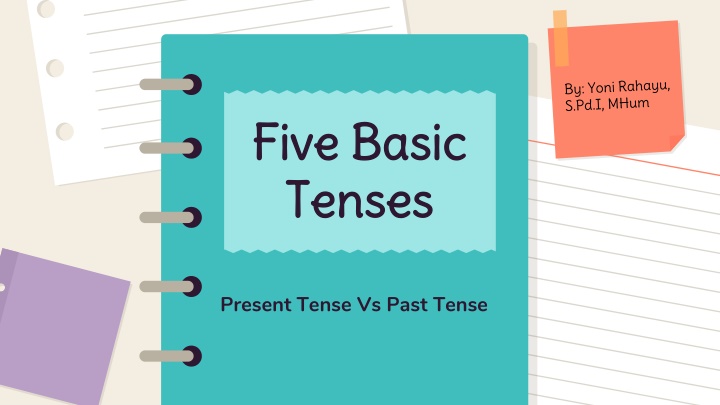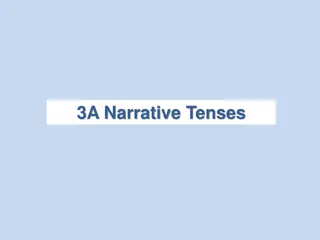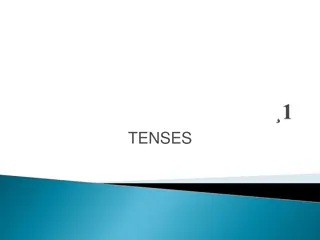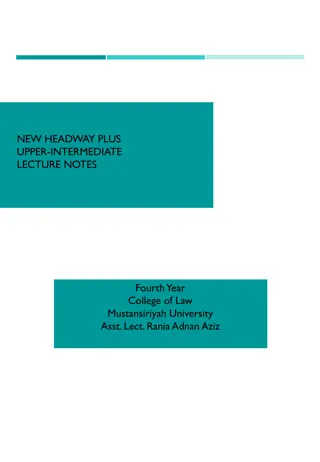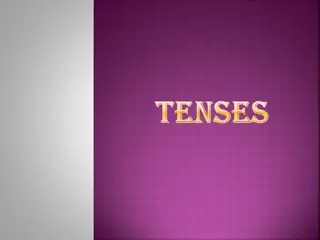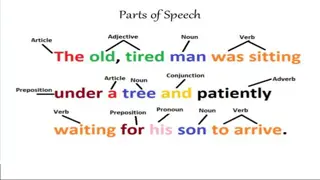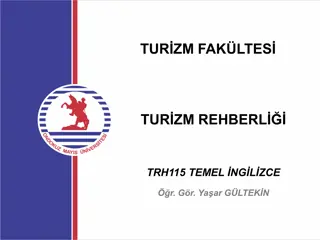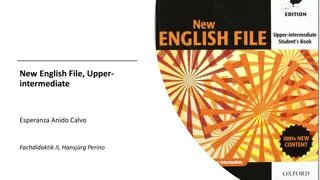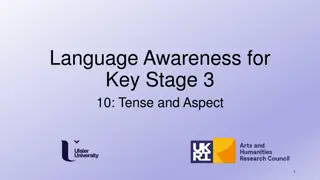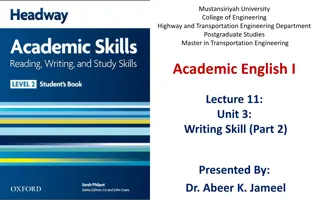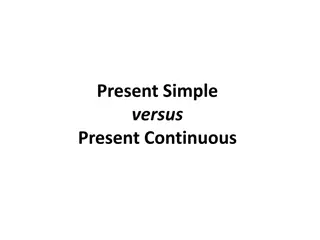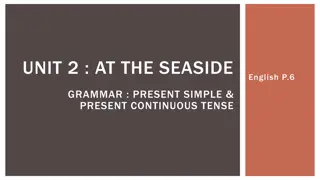Present vs. Past Tenses in English Grammar
Exploring the basics of present and past tenses in English grammar, covering affirmative, negative, and interrogative structures, as well as adverbs of frequency and quantity. Learn about describing general facts, habitual actions, and specific past events through detailed examples and visual aids.
Download Presentation

Please find below an Image/Link to download the presentation.
The content on the website is provided AS IS for your information and personal use only. It may not be sold, licensed, or shared on other websites without obtaining consent from the author.If you encounter any issues during the download, it is possible that the publisher has removed the file from their server.
You are allowed to download the files provided on this website for personal or commercial use, subject to the condition that they are used lawfully. All files are the property of their respective owners.
The content on the website is provided AS IS for your information and personal use only. It may not be sold, licensed, or shared on other websites without obtaining consent from the author.
E N D
Presentation Transcript
Five Basic Five Basic Tenses Tenses Present Tense Vs Past Tense
describes all about general facts, habitual actions, or things that do on a regular basis.
Object/ Complement Negative (-) Subject (I, you, they, we, she, he, it) Tobe (am, are, is) Not I am hungry not Subject (I, you, they, we, she, he, it) Object/ Complement Interrogative (?) Tobe (am, are, is) Object/ Complement Affirmative (+) Subject (I, you, they, we, she, he, it) Tobe (am, are, is) Are your friends Good? She is a student
Affirmative (+) Subject Verb 1 (s/es) Object/ Complement Verbal Verbal Pattern Pattern We Fish study lives English every Monday in the water Negative (-) Subject Do/does Not Verb 1 Object/ Complement We Fish do does not not study live English every Monday in the water Interrogative (?) Do/does Subject Verb 1 Object/ Complement Do we study English every Monday? Does fish live in the water?
Adverb of frequency (always, usually, sometimes, occasionally, never, seldoms, etc). Adverb of quantity (once ..., once a day, every ..., every day, every morning, twice ..., twice a week, etc).
Tell about the past or completed actions in the past that are connected to a specific or definite time.
Object/ Complement Negative (-) Subject (I, you, they, we, she, he, it) Tobe (was /were) Not Happy yesterday The two boys were not Subject (I, you, they, we, she, he, it) Object/ Complement Interrogative (?) Tobe (was /were) Object/ Complement Affirmative (+) Subject (I, you, they, we, she, he, it) Tobe (was /were) georgous in the party lastnight? was she I was fat last year
Affirmative (+) Subject Verb 2 Object/ Complement Verbal Verbal Pattern Pattern You The girl ate watched Pizza last afternoon Korean movie last night Negative (-) Subject Did Not Verb 1 Object/ Complement You The girl did did not not eat watch Pizza last afternoon Korean movie last night Interrogative (?) Did Subject Verb 1 Object/ Complement Did you eat Pizza last afternoon? Did the girl watch Korean movie last night?
Time signals commonly used in Simple Past Tense: yesterday, yesterday morning, last ..., last night, last week, ago ..., two years ago, etc)
In Simple Past Tense, there are different used in forming verb. They are regular and irregular verbs. Regular verbs in English conjugation pattern by adding ed, ied or d to the base form of verb. follow a consistent Base form (Verb 1) Past Simple (Verb 2) Past Participle (Verb 3) Cook Help Love Study Cooked Helped Loved Studied Cooked Helped Loved Studied
While, Irregular verbs have different ways in forming in unusual ways. We can divide this into four types: Verbs which have the same base form, past simple and past participle Verbs which have the same past simple and past participle Verbs which have the same base form and past participle Verbs which have a different base form, past simple and past participle Base form (Verb 1) Read Buy Come Drink Eat Go Past Simple (Verb 2) Past Participle (Verb 3) Read Bought Came Drank Ate Went Read Bought Come Drunk Eaten Gone
Do you have any Do you have any questions? questions? yonirahayu15@gmail.com Thank you! Thank you! CREDITS: This presentation template was created by Slidesgo, including icons by Flaticon, and infographics & images by Freepik Please keep this slide for attribution
Identify the tense of the sentences! (Present Tense or Past Tense) My hospital. He had a bad trauma in his school last year. His brother doesn t motivate his friend to be a good boy We discuss about people s Mental Health every Monday. Brian was nervous on the stage. sister is a counselor in 1. 2. 3. 4. 5.
